A little while back I covered SimTex's Master of Magic in a trio of Brief Jaunts: a truncated LP intended to familiarize people with old DOS classics, though it inadvertently became a slideshow of tiny, tiny pictures (dang ol' DOSBox image capture). At the time, I lightly expounded on just why Master of Magic continues to be a perennial favorite of mine, while demonstrating some of its basic mechanics and the absurdly broken Warlord + Halfling Slingers strategy. I didn't get too far into it though, just kind of going over the basics in a brief screenshot LP format. I've yet to make a decisive case for why I love this game so much.
The truth is, while I've played and enjoyed a handful of games from the empire-sim genre (such as Sid Meier's Civilization, Bullfrog's Populous and Sensible Software's Mega-Lo-Mania), I don't actively seek out games of that type. I generally don't care for any type of strategy game where there's a clump of opponents plotting my downfall and working ever closer to those goals while I mill around chasing minor projects like an idiot who for all the world believes he has nothing but time on his side. There's also the matter of how old Master of Magic is now -- 20 years! This month! -- and while some mechanically less-complex genres can foster the sort of timelessness that ~20 year old games such as, say, Super Mario World or Doom can enjoy, those like the in-depth strategy-sims are usually far better served through generations of tweaks and feature additions as players are given ever greater control over the empires and armies and worlds under their command. Master of Magic in particular is such a huge mess of complex systems and features, which unfortunately was the reason why it was so broken at launch, that you'd think it would be quickly supplanted by a more advanced subsequent fantasy city-sim that could better realize what it was trying to do.
Despite all of this, Master of Magic endures. I've always suspected that it's because SimTex secretly turned out a nigh-perfect implementation of its concept once the various bugs were ironed out, and the reason that subsequent games that have followed its footsteps have fallen short, whether they were intending to topple it at the time or honor it with a modern remake, is because the original was a culmination of great ideas that coalesced in just the right way, dooming any attempt to alter that formula to become an invariably lesser product. Of course, this is all my opinion, and I'm sure others are of the mind that Age of Wonders or Warlock: Master of the Arcane or Eador: Masters of the Broken World or Disciples are the superior game/series. They certainly all have their strengths, and a lot more polish. For me, though, it just feels like there's something missing with those pretenders to Master of Magic's throne; something that stops those games short from reaching its level. These games clearly have an appreciation for what Master of Magic did, but perhaps not the full realization of just how it did it.
Because Master of Magic is enjoying its 20th birthday this month, I've decided to revisit it in a little more detail. I've messed with video recordings and screenshots, but I think I'm going to have to go deep with a big ol' text dump to fully understand what it is about this game that puts it so high in my estimations. Consider this a merging of an LP, an essay and one of those Mento + The Mechanics rundowns as I try to explicate what makes Master of Magic the master. Of magic. (Can you believe I actually edit these things?)
Magic Slider!
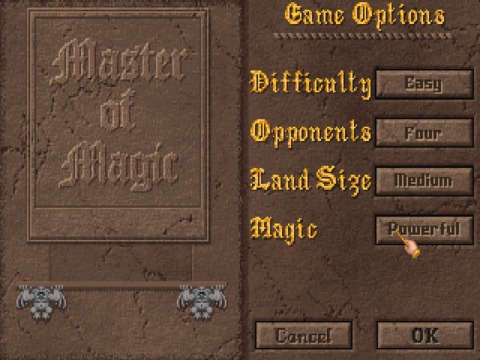
Right off the bat, the player is given a handful of fairly intimidating world construction conditions to mess around with. Most games of this genre have procedurally-generated worlds with some degree of user customization over the "seed" code that will go on to create them, and Master of Magic is no exception. While the standard options of changing the difficulty, size of the landmasses (that is to say, the percentage of world that is actually land instead of sea, as each generated world has a uniform map size) and number of CPU opponents are all fairly explicable and had already existed long before Master of Magic came to be, the player is also treated to a setting for the game's magic. Specifically, they're allowed to toggle between "weak", "normal" and "powerful".
It's actually a very minor decision, at least on the surface level. The only thing this setting affects is the strength of the magical nodes scattered around the world: these nodes are usually protected by random assortments of creatures of a matching element, and once emptied of its guardians and treasures the wizard can send a magic spirit (the most simple summoned being) to meld with it and transfer its power to the wizard's mana reserves. This node power becomes more of a vital commodity with a "powerful" magic setting, and control over the nodes becomes of paramount importance for the player wizard and their CPU rivals. In a sense, it's like the difference between arguing over a copper mine or a gold mine: you'd be far more determined to retain control over the latter. When magic is "powerful", the various nodes become the first port of call and wizards are likely to send armies to, well, "negotiate" over them.
Conversely, when node strength is low, magic revenue generated by the player's cities (in particular mana generated by certain buildings, and having cities placed near valuable mana-generating resources) become all the more valuable. A wizard's mana is his lifeblood, and the number of spells and how often those spells can be used is linked inextricably to how much magical power a wizard can procure. In this scenario, the wizard is best served by founding a lot of towns, or taking over existing settlements, in order to maintain a mana advantage.
So as a somewhat ambiguous throwaway setting on the world creation screen, it sets an interesting precedent to the sort of game Master of Magic ultimately is. Its effects are far more subtle than a new player might realize, but still makes for an important consideration when strategizing. Many of Master of Magic's seemingly cut-and-dry elements actually come with their own caveats, compromises and conditions. Likewise, some of its smallest stones can still cast large ripples.
Wizard Creation!
![Wraith Fiennes ain't nuthin' ta [radio edit] wit.](https://www.giantbomb.com/a/uploads/scale_medium/2/23093/2681865-mom002.jpg)
An unusual decision at the time was to allow players to create their own wizard character, forsaking the many pre-generated and archetypal wizards provided by the game. Unusual in part because each of the wizards has their own distinct personality based on figures from history (well, literary history and world folklore anyway, I'm not sure there were many real wizards) much like the rulers of Civilization, and that veteran players of the game might bump into, say, Horus and realize that their future is going to be filled with annoying floating islands and flying units to contend with. Sssra the Draconian will almost always be the one opponent the game dumps on Myrror, Lo-Pan's not to be trusted and Tauron will as likely set you on fire than reason with you.
However, their personalities are just as much defined by innate dickery algorithms as by their magic tome configurations. Each wizard has an assortment of magic books of certain elements, and these determine which spells they end up learning. However, they can also influence aspects like eagerness to wage war and trustworthiness, depending on the traits of that particular element of magic. Chaos magic breeds violent and unpredictable nutcases, Sorcery creates surreptitious spymasters who are able (and willing) to dispel enchantments on a personal and global level, Nature begets genial but territorial rivals. Life wizards are fanatical and build deadly armies of empowered crusaders, and also have more freedom to cross the planes. Death wizards are just bad news period. What's more, these elemental compositions define how well you're likely to get on with another wizard, as having a magical commonality with someone opens the door to sharing spells and engendering warmer relations. This can lead to situations where a wizard that you were friendly with in one game can become your bitter enemy in another because of a different set-up.
The second reason why configuring your own ruler was unusual is because it opens the door to exploitation, especially as the player is also allowed to select "retorts": innate bonuses that a wizard may choose instead of magical tomes, lowering the number of spells they might learn but conferring advantages of a different sort. Part of what's amazing about Master of Magic is that there's very few ways to exploit the game this way. The purpose of retorts, rather, is to offer veteran players different ways to approach the game. For instance, the Conjurer retort lessens the cost of spells that summon creatures and their upkeep, which makes it a far more viable option for those who want to focus their magic powers on summoning. Warlord is perfect for those who intend to train regular armies instead, relying less on ethereal beasts and putting their magical effort into enchanting the troops and heroes they hire. The retorts and magical tome compositions of a player-created wizard offers near-endless replay value, and because of the relatively simplistic way the game determines how two wizards will get along, a created wizard feels as much a part of the world as a pre-made one.
Race Selection!
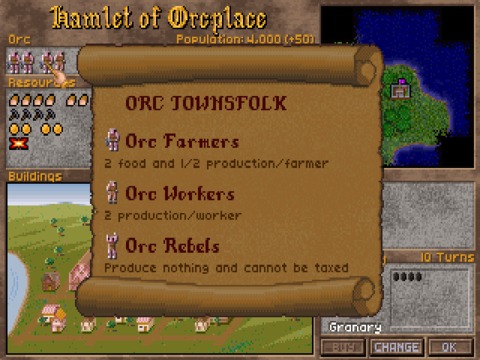
The last stage of the world creation process is selecting the race of the player's first city. It's another fairly minor decision, because the world is randomly populated by any number of other races irrespective of the one the player chose. However, the player's capital is almost always going to be the most important city, especially early on when it's the player's only city, and the type of race you choose can be important for the sort of game you're planning to play, much like the retorts and tomes of the prior step.
But man oh man are there a lot of races. Nine for the basic plane of Arcanus and five more for the alternate plane of Myrror. Each of these fourteen races have their own special bonuses, their own unique units and their own dispositions towards other races. As with many aspects in the game, the variation doesn't so much create a tier system of "good, better, best" but creates preferable options for the many specific ways the player might choose to play the game.
What's not immediately apparent is just how certain races work. Orcs, for instance, are not a martial race of barely tolerated monsters, but one of the most productive and gregarious of the races, having access to almost the full breadth of the city construction tree. That leaves them with little in the way of unique units (they have but one: Wyvern Riders), but an Orc city is likely to be one brimming with industry. They also have a higher than average growth rate and other races generally like them, reducing the amount of unrest whenever the player adds a new Orc city to their empire. Though traditionally antagonists, in Master of Magic Orcs make for a fairly decent starting race for beginners.
The breadth of choice might seem intimidating, but there's no big penalty for selecting the "wrong" race. Chances are, the first neutral city your units find will be owned by a different race and give you more options to work with. A single playthrough gives the player opportunities to play as a whole menagerie of sentient races, giving them plenty of food for thought about choosing a race more beneficial to their style of play for next time. Personally, I just find it fun to switch up every new game. Even the hated insectoid Klackon can make for an interesting game, as their enhanced production bonus can lead to plenty of new hives popping up all over the world. Something to be said for riding giant stag beetles into battle, too.
Myrror!
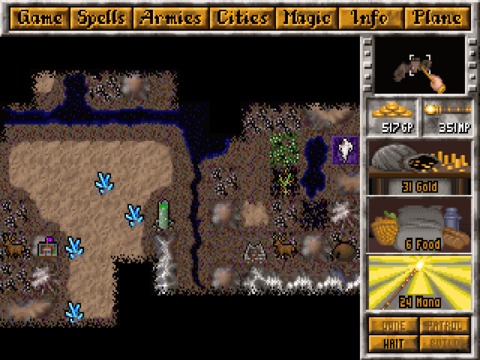
I've mentioned it a few times, but one of the more overt differences between Master of Magic and its peers is the alternate plane of Myrror: an entirely separate world that effectively doubles the overall map size. Myrror works similarly to the Underdark of the Forgotten Realms D&D setting: there's a lot more danger, but also more to gain. The dungeon rewards are greater, the player has access to adamantine and the races are far more interesting if a bit more severe with their strengths and weaknesses. Being able to start on Myrror is an expensive pick for any wizard at the beginning of the game, and given the general difficulty boost it's usually a better idea to start on Arcanus and find the closest Tower of Wizardry: these structures aren't all that more dangerous than your average ruins or node, and serve as instant travel points between the two planes once conquered. Chances are, with the exception of the one CPU player that starts in Myrror, the second world will be ripe for the picking as none of the other CPU opponents really prioritize dungeon-delving and planar travel. A good mid-game strategy has always been to find a way over there and start taking over the many neutral cities, reveling in the lack of competition for resources.
What's more is that Myrror is just a straight up cooler place to hang out. It feels far more alien and bizarre than the sunny and relatively normal Arcanus, and it offers plenty of late-game monster lair instances for players who still want to keep bashing dungeons with their killer party of heroes, summoned monsters and army units. Jumping into Myrror's often one of my first goals, because I just like hanging out there, starting towns linked by magical paths that units can travel on indefinitely, seeking out locations surrounded by mana crystals and other rare and wonderful resources to set up new cities. My usual go-to whenever I talk effusively about Master of Magic is that it's often far less fixated on trying to outdo your opponents, and gives you plenty of opportunities to just assemble a band of heroes together to go out exploring and make a name for themselves. Myrror is an embodiment of that wanderlust.
Information Gathering!
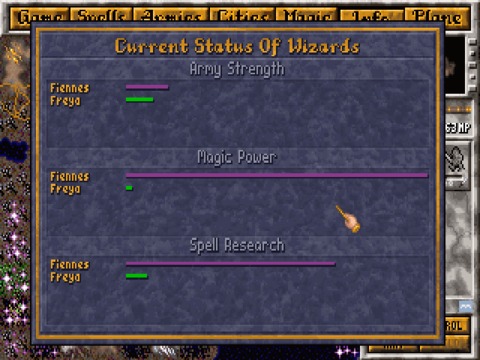
Master of Magic surfaces a lot of information about its world. It doesn't quite go so far as revealing the building or spell research trees in any sort of "Masterpedia" (it would take an awful lot of implementation, given how much data there is), but it does give you a full cabinet of advisers that you can turn to whenever you need to know something about the current status of the game. You have standard statistics nerd stuff like your Historian and Astrologer, both of whom rates you comparatively alongside the rival wizards you've met. There's the Cartographer, who displays the world map with annotations. The Apprentice tells you what spell you're currently researching, the Chancellor lets you review the turn's events (like population growths), the Tax Collector lets you reap in more cash from populations at the risk of increasing unrest and the Mirror lets you see your own status.
The two most important advisors, at least as far as I'm concerned, are the Grand Vizier and the Surveyor. The Grand Vizier is essentially a setting that lets the game handle building construction in cities automatically. This frees the player to focus on warfare and exploring the world, rather than micromanage every city in their domain. This option becomes more valuable the more cities you own, especially if you're focused on a certain goal and don't want to be distracted at the start of every turn by a bunch of remote villages which need a new granary or shrine. Many players might balk at relinquishing any control to the CPU, however, and it won't necessarily make the wise decisions that a player-controlled wizard would. For instance, it's only really necessary to build units in a single town that has a full suite of war colleges and barracks and other advanced unit-enabling structures. Troops from that one city can then be deployed anywhere in the world, provided the player has some patience or a little bit of teleportation magic up their sleeves. Creating a squad of elite soldiers of a unique class in a handful of turns in a city built primarily for that purpose and sending them marching halfway across the world to where they're needed usually ends up being far more preferable than generating a bunch of local spear-wielding nobodies that get knocked over by a gust of wind (occasionally literally; it all depends on what spells the enemy wizards have). Still, at the end of the game where you already have your Army of Death (TM) cutting a bloody swathe across the world, it helps to have someone tending to the smaller stuff back home. But then you probably don't need to worry about new buildings at that point anyway.
The Surveyor is useful for creating settlements, as the guy measures the lay of the land and determines how suitable an area it would be for a new city. It tells you what terrain bonuses a tile provides, gives you a hypothetical maximum population of any city built in that area and also tells you what sort of food and production bonuses it's likely to enjoy from the surrounding landscape. What's more, the Surveyor records scouting reports, reminding you what the various dungeons and nodes on the map contain if you've already gone in there to take a look around. He can be very handy when it comes to selecting a possible destination for armies and settlers alike, and it's a little nuts that the game deigns to reveal this information to you. Actually, it seems absurdly generous that it would tell you how well your opponents are doing too. Either way, the Info panel makes for some very useful data gathering and I can certainly appreciate some hard info in my strategy games. Most just don't reach that "obsessed stalker" level of fact-finding.
Structure Trees!
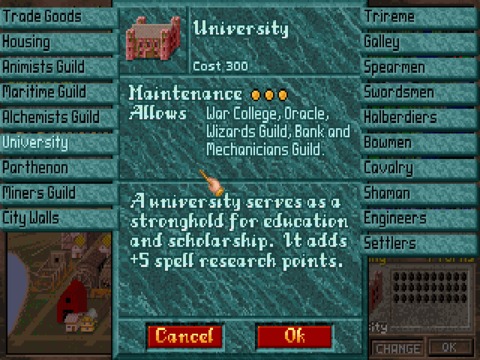
I actually love the city-building aspects as much as the combat and magic in this game. Though each town has a certain critical path that it would be wise to follow early on, further development really comes down to the sort of cities you want, or need, to create. The revenue of gold, food and sometimes mana increases the larger the population gets, but beyond that the player has to consider what kind of needs they have and what strengths each particular city has, given its race and its surroundings. A city nestled in the mountains will have a much faster construction rate, but will be lacking for arable farmland. Likewise, a city surrounded by grasslands will never be wanting for food, but might struggle to reach a metropolis at anything near the speed of the former example.
It gets even more conditional. A city surrounded by forest would be ideal place to build a sawmill, but such a structure would not be worth the upkeep in a city lacking a lot of surrounding woodlands. If there's nightshade nearby, the player will need to build a shrine to take advantage of it (and take advantage they should, as magical immunity is nothing to sneeze at). Alchemist's Guilds allow troops to be generated with magical weapons, but the player's wizard might already have the Alchemy retort which generates the same effect, making the building slightly less valuable. Mineral deposits like iron, coal, mithril or adamantium reduce the cost of military unit production (and confer magical weapons in the case of mithril and adamantium) and make ideal places to set up unit-producing cities. Conversely, any structure that increases the level of a military unit, or allows more military units to be made, is fairly useless for a remote city with no roads that is far from any border to a rival wizard's land. A lot of considerations have to go into building cities for specific purposes, and it's one of the more strictly strategic parts of this game that I enjoy. Lots of thinking ahead.
All the same, there's something engrossing about building every possible structure in one place and seeing the overhead view of the settlement become a bustling metropolis of industry and magical power. Likewise, casting city spells that allow it to be shielded by a wall of fire or float through the air can really bring some personality to the place. You end up becoming as fond of the cities you own as you do about the heroes you're training, and it's just as painful when you lose one to carelessness.
Troops!
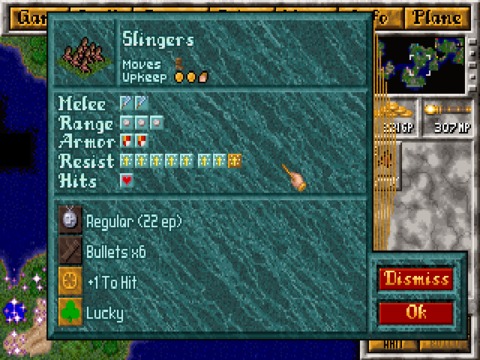
This factors more into the combat side of things, which I'll eventually get to, but the way soldier units work in Master of Magic can be somewhat deceptive. Every unit in the game, be it a hero or a monster or a common soldier, has a bunch of stats that determine physical strength and defense, resistance, movement and health. What's less apparent is that these stats apply to every singular creature within the group. A group of eight beings, therefore, collectively has eight times the stats on display. The more powerful the individual troop type, the more likely that they'll move in a smaller group. This is especially true of cavalry, which usually march in groups of four (unless they're riding enormous fantastical creatures like dragon turtles or stag beetles, which have even smaller groupings).
Units can therefore be deceptively powerful with the right enchantments. We'll take the example of eight spearmen: Each fights separately within each round of combat, but it's usually the case where the low hit percentage chance of each individual soldier results in a lot of misses, creating a small amount of damage output from the unit as a whole. Simply making them more accurate, however, greatly increases the damage output as more of those eight hits actually land. Giving each of them a magical enchantment that lets them breathe fire, which adds a little bit of damage to the start of a melee round, vastly increases the damage output as the same bonus is added eight times, while for a hero the same enchantment would only be applied once.
The temptation for new players is to summon a Final Fantasy game's worth of mystical creatures and group them with heroes and send them all off to beat up jerks. It's easy to overlook the humble squad of troops due to their relative lack of spark and lousy stats. Even so, there's situations where the right mix of hero-enabled bonuses and magical enchantments can create truly devastating armies out of the most harmless looking troops, and there's even cases like the Halfling Slingers where an innocuous little bonus like being lucky, which simply boosts a unit's chance to land a hit, can make them utterly devastating in greater numbers. As each unit can level up through experience much like heroes, you start getting attached to the scrappy bands of veterans in your charge who have survived numerous encounters with much bigger armies and various terrible creatures. At least, far more attached than you would be to some nameless horror you called from the ether to go stomp on things. Unless you named it Stompy, that is. How can you not love a pet named Stompy?
Unit and Hero Powers!
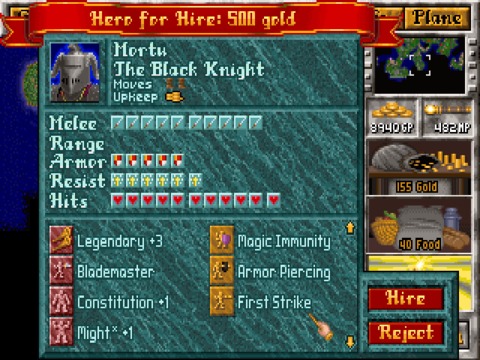
But, of course, this being the game that it is, there's far more complexity on a unit level than simple numbers. Heroes especially are the center of the maelstrom when it comes to dozens of different powers and abilities that can subtly affect their proficiency in combat and compatibility with other units. The most immediately obvious beneficial powers are those that grant movement bonuses on the world map, such as Pathfinder or Mountaineer. Stronger heroes and monsters might even have innate Water- or Wind-Walking skills that affect the whole party, making them ideal for ferrying around troops.
Many magic-user heroes can not only use ranged attacks in battle, but can cast spells from the wizard's spellbook. Certain troops and monsters can do the same. Others can earn you bonus gold, mana and research points, while others still buff the stats of all the units in their stack. Because heroes can also equip items, which themselves can carry all sorts of enchantments, you'll quickly discover that heroes can be a very dangerous and unpredictable commodity. It's worth hiring a few heroes in every game and seeing how they turn out at higher levels, because certain skillsets can really make a difference to a hero's later development.
Remember what I said earlier about heroes being a singular unit and often overestimated compared to high level troops? With some heroes, the reverse is true, because it's so very easy to overlook a single dude on a horse at the back of armies filled with griffins and war bears. Heroes have the greatest capacity for growth, and have the highest damage potential and stat caps. Unlike summoned creatures, which never get any stronger unless you cast enchantment spells on them, heroes start weak and grow steadily more powerful, some eventually overpowering even the strongest monsters. A special hero that only Life players can summon, Torin the Chosen One, is the most powerful unit in the game. I guess it's no surprise that heroes pack so much firepower, as anyone who has played Heroes of Might and Magic or Warcraft (or, hell, any RPG ever) is probably familiar with the idea, but it's always worth seeing just what a hero can do by checking their overview before deciding which unit in an enemy's army is likely to give you the most trouble. If there's a dude at the back glowing with eldritch magical energy, it's probably gonna be that one.
Enchantments!
So yeah. About that glowing eldritch energy. If you're playing a wizard of the Life or Sorcery element or simply don't care for summoned creatures, you've got a few other options for where you'll want to be channelling your magical energy. Of course, you'll want a reserve of mana to throw offensive spells in the midst of combat, but once you have a few nodes (or a lot of worshippers, depending on how you're playing the mana intake route) under your belt you'll release you'll have something of a surfeit of dire magickal energies.
There's a few permanent (well, as long as you can pay the upkeep) spells that you can start using once you're noticing that you're earning more mana than you can spend. The most interesting, by my reckoning, are the number of permanent enchantments you can give units under your control. Some are contingent on particular instances: you might temporarily need someone who can see through illusions in order to survive a fight with invisible/phantom units, say. Others are just useful buffs worth keeping around, even after their effects become negligible (though it's a fair chance that the mana cost to keep them going at this point would also be negligible). It's something a player new to the game can have fun exploring, like so many of the other factors in creating a wizard and setting a race and building the first towns.
It is always worth keeping in mind that going enchantment-heavy makes certain other magical routes less viable. One such example?
Summoning!
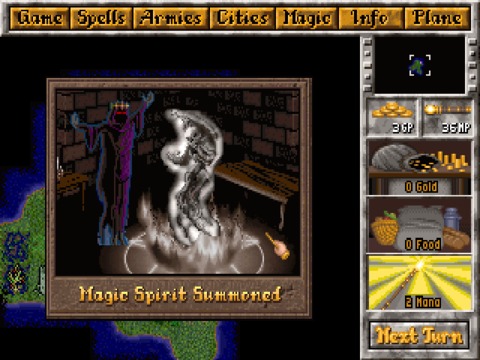
Summoned creatures can require absurd amounts of mana upkeep the stronger they get, so what's generally best is to pick a target destination, move your summoning circle as close to it as possible (which means setting it up in the nearest friendly city) and create something you intend to banish as soon as its task is over. Of course, each summoned creature requires a hefty mana cost in addition to hemorrhaging mana every turn, so it pays to be resourceful if this is the way you to want to spin things.
And why wouldn't you? Summoning creatures, though perhaps not the most cost effective route to victory, is easily the most fun. Especially if you've gone all in on Death, Chaos or Nature, which all have an embarrassment of riches as far as summoned unit types are concerned. Creatures that hit hard and get hit hard in return -- glass cannons, to use the common parlance -- can be sent in and get devastated by the veritable safari of unruly creatures, but chip away at their numbers all the same. A particularly tough dungeon can be dismantled piece by piece by these attacks, if the player wants to take such a cowardly route. The alternate would be to bring your best meatshield summoned creatures (the Behemoth or Hydra are wonderful for this) and pack as many archers and mages as you can fit into the stack as support.
As much as you might rue the loss of the mana you spent summoning something, these eidolons or guardian forces -- or whatever your preferred nomenclature -- are prized largely for being expendable. They never level up, they never get any more powerful, and any creature can be summoned again at equal strength with enough time and resources. Of course, there's no harm in dabbling in elementals either, who have the benefit of being able to be summoned directly into battle then and there. Fire elementals are weak but hit hard, air elementals are invisible and quick and work as ideal ranged unit eliminators and earth elementals are literally built like brick shithouses and move almost as fast. There's a certain degree of tactical utility to all three, especially if an enemy army just marched into a relatively unprotected town.
Global Enchantments!
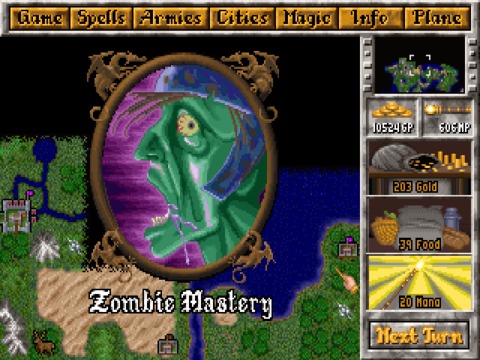
Continuing on our applications of magic, we have the third of five paths any wizard can follow if they find themselves earning more mana than they know what to do with. Global enchantments are few and far between, but they have one aspect that perhaps supersedes all others: a global enchantment, when cast, is immediately apparent to all rival wizards. Indeed, it affects everyone, though some feel the effects more strongly than others. In particular, few offensive global enchantments actually target the caster, though they aren't always spared. It's pretty effin' ballsy to call everyone out like that, and even more ballsy to ruin their shit from half the globe away.
Global enchantments are, perhaps obviously enough, some of the most powerful spells in the game and usually require a massive draw from the player's reserves to keep active. We're usually talking double figures per turn, and all the while the rival wizards grow more suspicious of you (or outright hate you) for your brash display of power and/or testicular fortitude. A minor global enchantment, Aura of Majesty, engineers your opponents' temperaments to like you more, but the rest tend to have a minor to severe negative effect on how others perceive you.
But you know what? Screw 'em. Some global enchantments are downright terrifying in their power, and they're right to fear them. Some are even straight up end of the world scenarios, like the Chaos wizard's Armageddon, which will systematically destroy both worlds with two fresh new volcanoes every turn, feeding mana directly to the caster at the cost of, well, everything. A Life wizard can use Crusade to boost the experience level of every single unit under the caster's command, including newly produced troops, making a large enough army nigh-unstoppable. Nature has a couple of good ones: Nature's Awareness fully reveals the map (you can turn this one off right afterwards if you don't care to watch a bunch of CPU troops move around between each turn) and Herb Mastery instantly heals all the caster's units at the end of every turn. If a Sorcery mage has 150 mana per turn to burn off, and that would be something of a miracle, they can simply stop time itself for everyone but themselves. As for Death? Well, they can either cast Zombie Mastery which creates a fresh (well, by one definition, if not another) squad of zombies with the death of every normal unit or cast Death Wish to simply kill everyone, everywhere, unless they can somehow make a tough resistance roll. Hey, guess what enemy wizard? All your cities are full of zombies now. Deal with it.
These are spells you use when you want other wizards to know you're serious. They're prohibitively expensive and absurdly overpowered, but there's no better way to intimidate folk. Well, except the CPU can't really be intimidated, but why let that spoil the fun? Let them crap their collective wizard robes as you drop meteors from the sky and cast the world into permanent night.
Artificing!
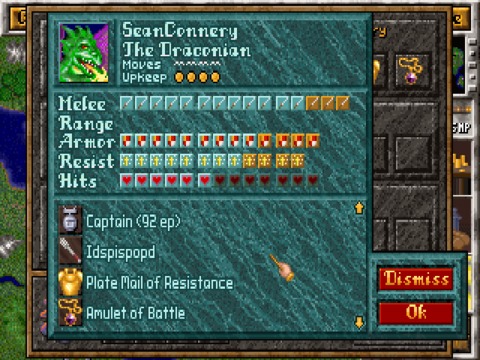
A wizard might come across artifacts and magical items every now and again, either via door-to-door merchants or through looting dungeons, but they can be a rewarding if expensive hobby if you decide to get into creating them yourself. Heroes all have several equipment slots, some dependent on their class (rangers use bows and don't use shields, for example), and if you have a hero that needs an extra bit of firepower or could use some defense, it's a fine idea to craft them a particularly strong piece of equipment to help them out.
The alternative would be to enchant a magical item with the most useful spells in your repertoire and hand it to the hero, then dispel the enchantments they already have on them. Item enchantments are free, once the items are created, and it could end up saving mana in the long run. Of course, this isn't an option for regular units and summoned creatures, as they are unable to use items, but then they're generally fine without enchantments anyway.
The issue with this is that a particularly strong Create Artifact or Enchant Item spell will take an immense amount of mana, dipping deep into your reserves and preventing you from casting anything else until it is done. If you're playing a wizard who doesn't particularly care about using magic every turn, or have a particularly large reserve to burn through, creating items for your characters isn't a bad plan. Then again, you can always keep raiding ruins and nodes and towers for whatever spoils they have and hope you strike it lucky with an item your heroes can actually use.
I really dig building artifacts, personally. It's a bit of a resource drain, but there's no better route to an unstoppable badass with a piece of equipment that confers some high-level stat boosts and a few vital enchantments. Being able to micromanage the stats for a piece of equipment allows you to cover the weaknesses of the heroes in your thrall. It's the pro option if you're going all in with an overpowered hero, and I've managed to create guys who can walk into dungeons filled with the worst monsters imaginable and waltz right back out again without a scratch.
Alchemy and Other Resource Management!
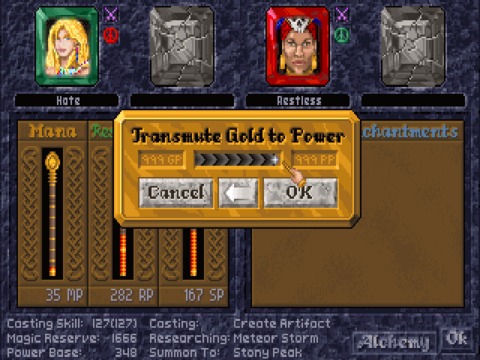
The final use for mana is to simply transform it into gold. The reverse too, if necessary. You'll take a 50% loss no matter which direction you go in, unless you pick the retort that always makes it an even exchange. This retort, Alchemy, is superbly useful because it can cover your ass when faced with unforeseen circumstances. One such circumstance is discovering that there are no nodes nearby after the starting the game, but plenty of rich ruins to plunder. If you're generating so much magic that it's getting ludicrous, turn it into gold and burn it on some new buildings and units, which can be instantly built if you're prepared to make it rain a little.
The best part of the Alchemy retort is that it effectively adds gold and mana together into a single resource. Even if both reserves say 100, you'll always have 200 mana or 200 gold if you happen to need either. It's another situation where the game creates something that initially appears to only have mild utility, but can actually be invaluable in the hands of a player who knows best how to use it.
Scouting!
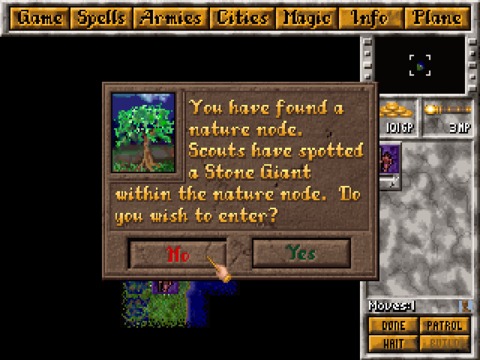
One of the first things you should do, and one of my favorite steps of the usually rough and laborious early stages of the game, is send the little spearman unit you are given to poke around the nearby geography, gingerly checking out nearby dungeons (which is to say, ruins, nodes, towers, the usual stuff). The game is gracious enough to give you some idea of the danger within before forcing you decide whether or not to pick a fight with the inhabitants, but shrewd enough to not give too much away. Generally speaking, the scouting report will tell you the most powerful unit in a dungeon. it won't tell you how many of that unit are in there, or if it has any weaker but still troublesome buddies. It's very possible to wander into a Nature node, say, knowing there's only war bears in there and then getting hit with a barrage of magical attacks from a few packs of sprites. Those little guys can pack a wallop in numbers, often taking down a low-level hero in a single combat round.
So there's no real reason to trust that the scout report is entirely helpful, but it does mean that you can mentally note a place for later once you have a bit more muscle in your employ to take it out. It takes some experience with the game and its units to understand just when this point will be, but most encounters can be put into a rough "low-level, mid-level, high-level" tier system for simplicity's sake. If you're feeling adventurous, playing on a lower setting or are simply not averse to save-scumming, you can go into one of these places and get the full lowdown before bugging out. It's risky stuff, but nothing makes planning strategies easier than knowing exactly what's in there. You can even walk up to a node with a full army in one stack and a "canary" unit in the other who can hop in, get the full report and get brutally dismembered; possibly a low-level summon like a magic spirit that you can create instantaneously. It's generally a good idea to have a magic spirit ready to go regardless if you have designs on a node, as I've mentioned previously.
The strategies around scouting are endless, and it comes down to knowing just enough that any location is probably dangerous as hell regardless of how harmless it sounds. There's always the possibility that the place is entirely empty too in which case, hey, free stuff.
Combat!
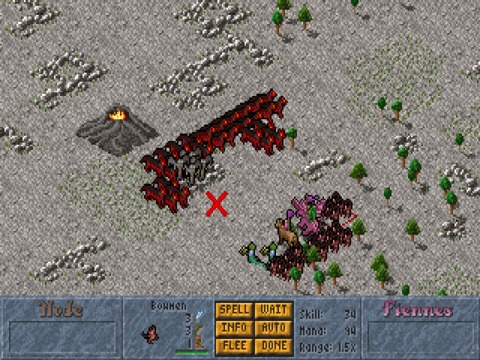
Man, it's probably about time to discuss what I like most about the combat, huh? I feel like after talking about the units, the magic, the skillsets and the equipment that I should probably get around to when all of it becomes necessary. Combat in Master of Magic is a far more involved affair than most games of this genre generally allow. Rather than throwing two stacks of creatures against each other and removing those which land face-up, every unit needs to be moved around a grid like a strategy RPG. World map movement bonuses can still apply in battle, as flying units cannot be attacked by grounded melee. Invisible units can't be targeted by any ranged units, unless they have a special ability. All these fun little rules can make every fight different and interesting, if occasionally an unpleasant surprise.
What doesn't quite come across in these pictures are how tense it can be when you put two units together and make them fight. A little MIDI roar and some blood splatter later and one emerges the victor, and it's not always the one you might expect. It's at this point that you realize a certain someone has run afoul of the game's randomized dice rolls, or that one particular unit was packing some heat in the way of a subtle enchantment or a much higher experience level than anticipated. It's also terribly invigorating, by which I mean rad as hell, when some enormous lumbering beast wanders up to a hero you've put a lot of time and effort into and gets its ass kicked trying to land a hit. Units don't so much collapse on the battlefield as simply vanish as soon as their HP runs out, and at that point they are gone for good. Sending a hero into a clump of enemies and blinking to find the hero standing alone is badassery in a bandana.
At the very least, this system can get you attached to individual units as you get used to directing them on the battlefield, and you'll probably find yourself moving a hero in critical condition around the edges to escape a deathblow while the rest of your army tries to finish off what's left. Nothing's more heartbreaking than seeing a unit one's been leveling up for dozens of turns disappear into oblivion.
Combat Priorities!
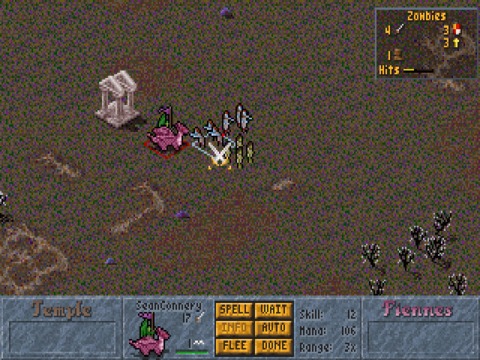
What's a little more nuts about the combat is how certain types of attack will either precede or supersede the standard melee. In normal circumstances, melee is simply the back-and-forth of attacks: each side rolls to attack and defend, and takes damage accordingly. As far as I can tell, this all happens simultaneously. If you have a lot of special attacks that apply before melee even starts, you'll regularly find yourself killing opponents while receiving nothing in return because you'll have diminished their health reserves before they ever got a chance to return fire.
These "special attacks" aren't always magical in nature. A "thrown" bonus, which is meant to suggest that the fighter throws an axe or javelin or whatever low-distance ranged weapon they were holding before engaging in hand-to-hand, can be found with a lot of regular troops and low-level heroes. Many faster units will have First Strike, which means they apply their melee damage first before the opponent does the same, rather than doing so simultaneously. Then you have things like breath and gaze attacks, which are usually the domain of monsters (and can be very nasty), but can be given to units with the right spells/enchantments. Any special attack that requires getting into melee range before it can stick, like poison or vampirism, has to occur during standard melee and not before.
When fighting something like Phantom Warriors, which have no defense but also ignore defense when attacking, an attack that applies before melee begins is the only sure way for regular units to survive the encounter. The same for heroes. Like a good "to hit" bonus, any means to apply damage to an opponent before they get the chance to reciprocate is absolutely priceless. However, it's one of those things you eventually pick up when playing this game and watching how certain heroes seem to emerge from battles without a scratch, while others seem to get as good as they give. It's another reason why this game rewards the attentive, and especially rewards those who use every battle and every campaign -- whether won or failed -- as a learning exercise. There's just so many (optional) tidbits of information to pick up each time, and that's key to the game's longevity.
Diplomacy!
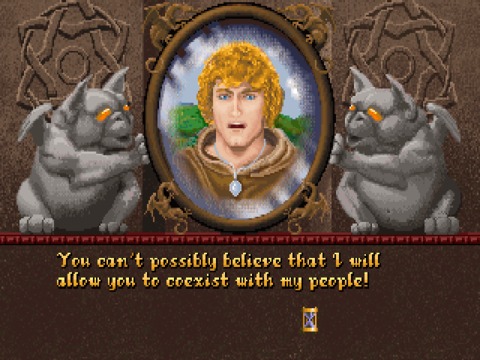
It's about time we discuss the rival computer-controlled wizards, or as we Master of Magic veterans colloquially refer to them as, "those assholes". You don't know who your opponents are until you bump into them, either via a wandering unit of theirs or an allied town. They'll introduce themselves to you, and then they become available to talk to or to spy on, via those helpful advisers of yours. As noted earlier, a rival wizard is pre-disposed to treat you a certain way depending on how closely your magical dispositions match. Sharing magical tomes gives you more in common and puts you slightly higher in their estimations.
The game has a subtle system for understanding a rival wizard's temperament towards you. All you'll receive is an adjective: calm, troubled, peaceful, unease, and so on. When talking to them, you'll notice that the gargoyles surrounding the magic mirror that acts as the magical version of FaceTime will have a certain eye color: this is another shorthand for how the wizard feels about you, with eyes tending towards green being harmonious and eyes tending towards red as perhaps a sign you should start bracing for a hissyfit.
It doesn't stop there, of course. Each of the CPU wizards have their own personalities, and discovering and understanding these personality types can help figure out what their future plans are. Expansionists won't stop encroaching on your land, building multiple hamlets around the edges of your territory until you snap and start razing the annoying resource-draining things to the ground. Maniacal wizards cannot be reasoned with and will probably wage war as soon as they find you. There's a bunch of others too, some governing their diplomacy, others governing their playstyle.
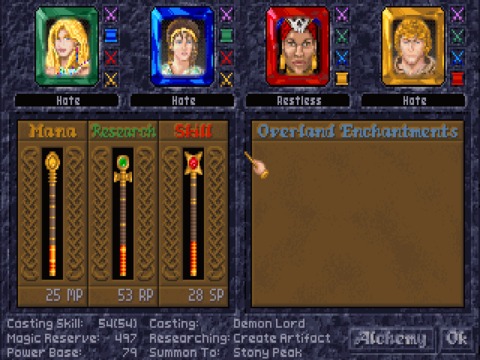
Then you have the super subtle stuff that you'd only know if you studied the manual or have played the game multiple times. Finer details like how Life magic, even if the rival wizard doesn't share Life books, will always put you in slightly higher stead because Life wizards are viewed as intrinsically trustworthy, and the reverse being true for Death magic. Turns out no-one likes a necromancer.
While being more powerful than other wizards can drop their trust in you, though usually not to the extent where they'll risk waging war at a moment's notice, being considerably weaker than other wizards makes it far more likely to for them to stomp you out of existence. It's partly why the harder modes are so much more difficult, because the CPU starts with more resources and is therefore way less into the idea of talking to you and would rather send a giant army over to discuss your eviction from the land of the living tout de suite. Also, as soon as you start casting the Spell of Mastery, absolutely everyone will wage war on you regardless of how warm your prior relations were: at this point you're going for broke, and no-one wants to sit around and watch you cast the spell that instantly banishes them into the Abyss.
There's something about how the use of magic makes every wizard feel more visible than what would normally be allowed for leaders in empire-sims, and how much information the game is prepared to give you either through your standard diplomacy toolset or via spells built for espionage and divination. Your historian and astrologer can tell you right off the bat just how well you're doing in comparison, and setting up Wizard Eyes in enemy territory can give you a fairly decent sense of what's going on regarding troop movements. There's even a spell that will tell you what everyone is casting, if you want to go full NSA on them. It's great that the game feeds your paranoid tendencies.
Node Management!
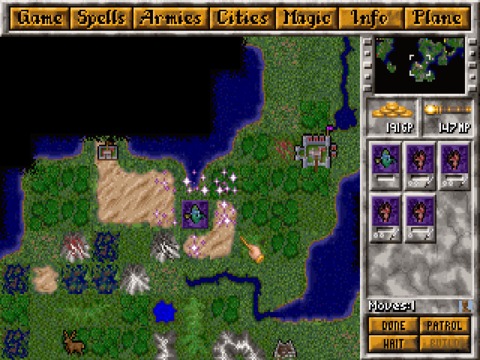
What makes messing with rival wizards fun, though, is when you both have eyes on a node close to both your territories. The amount of power generated by a node is directly proportional to how well it was guarded, and anyone who is able to emancipate a node from its protectors will have a magic spirit (the most basic summoned creature) ready to meld with it and bring in some much needed magical power. However, once a node is emptied, it becomes fair game for any wizard. If you send a single magic spirit to meld with a node, all a rival has to do is march an army in there and wrestle control away from what is, figuratively speaking, a floating bedsheet.
What tends to follow is a game of tag, where each wizard sends larger forces to stand guard over particularly valuable nodes, trying to dedicate as few resources as possible into holding onto the thing. This becomes a particular problem if you've set the game's magic as "Powerful" when starting up, as nodes become the default means of raising magical power, which is the most useful resource there is.
The levels of dickishness that your rivals are capable of will never be made more evident than when you find yourself playing node Pong with them. Anyone who's fought with the CPU over a goldmine in Heroes of Might and Magic can relate, I'm sure.
Events!
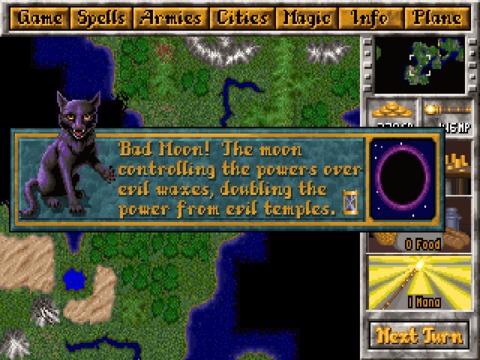
Random events can make a game very interesting indeed. A setting hidden away in the options menu, a random event has a chance of happening every new in-game year. Their effects can be substantial, from losing a lot of magical power each turn to losing a lot of reserve cash to pirates. There are positive ones too, of course, but the game is far more likely to throw bad ones at you if you're doing particularly well. Some events will persist for a long time, being a constant drain on gold/mana/food intake until they randomly decide to go away.
All the same, I kind of love this feature. There's the randomness factor, for one, which helps make every game somewhat exciting. It's also like turning on disasters in SimCity too: If you're finding that the game is too quiet it can be fun to have to occasionally deal with some unforeseen occurrence. It's also fun when it's a global event that affects everyone, too, as every wizard postpones their schemes for the time being so they can just weather the storm. It can suck when it's something like a mineral resource running out or a city falling to a rebellion, but at least it means you'll never be bored.
The "OP Point"!
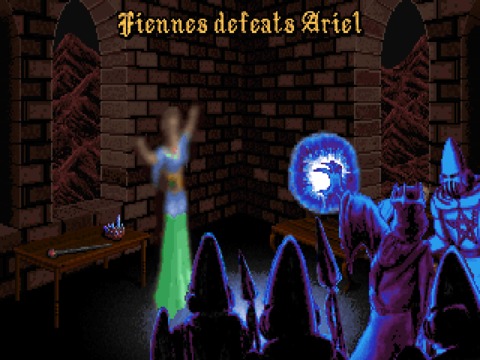
My absolute favorite part of any Master of Magic is the late-game, when you've cultivated unassailable armies of death and have control over most of both worlds. You can either end the game quickly by removing what remains of your rival wizards' forces, getting a time bonus that adds to a higher overall score, or you can eschew the time bonus and try to raise as much population and research as many spells as possible.
What's also feasible during this time is raiding all the difficult dungeons you decided to leave well enough alone after receiving a scouting report that was essentially just a prolonged scream, and reaping some extremely useful rewards. It's even possible to earn new spell books and retorts from dungeons, as well as finding prisoners (who become new heroes), artifacts and all sorts of interesting crap.
While the game perhaps becomes something of a giddy, childish power fantasy at this point, that's always been the best part of any RPG. When you've developed a team of adventurers to the point where you're taking down dragons and demon lords, each painstakingly earned victory throughout the game getting you closer to this godlike state, it's fun to indulge in some high-level encounters. The alternative is to use these Titans Among Men to stomp out a bunch of now mostly powerless wizards, and where's the fun in that? (It's actually very fun. Trust me.)
The Bit At the End
While I've certainly waxed lyrical on a lot of what appeals to me about Master of Magic, it always comes down to the nostalgia factor inherent with these hoary old pieces of interactive entertainment. I think this game is a piece of art, but at the same time I can fully appreciate that a new player could get turned off almost instantly by its age, its obtuse complexity and its relative primitiveness. I remember coming home from long days of school and staying up almost until the wee hours of the morning building an empire and just having a grand old time, enjoying myself with the fruits of my conquests and searching for new dungeons and cities beyond the fog of war. So for as much as the previous twenty bulletpoints have explicated my appreciation for Master of Magic, it's ultimately the two full decades of fond memories with it that keeps it firmly in my pantheon of the best video games ever made. Isn't that always the way with the weird old games we love?
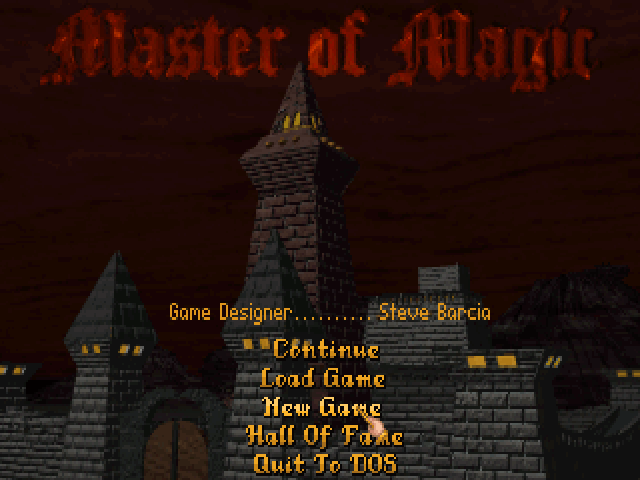
(Secret postscript: I only discovered this yesterday, but there was actually a Japan-only PlayStation port of Master of Magic named "Civizard: Majutsu no Keifu"! Even twenty years later, this game still finds ways to surprise me. I'm definitely going to have to look into that, my lack of Japanese reading skill be damned.)
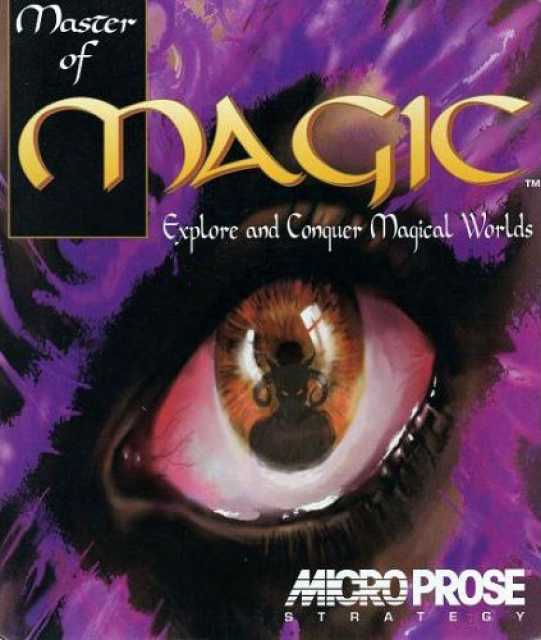
Log in to comment